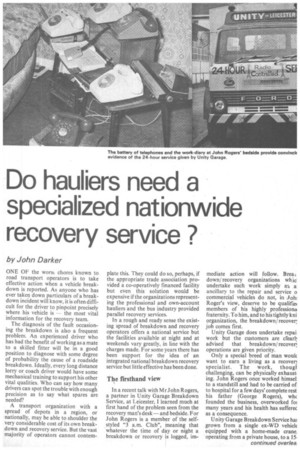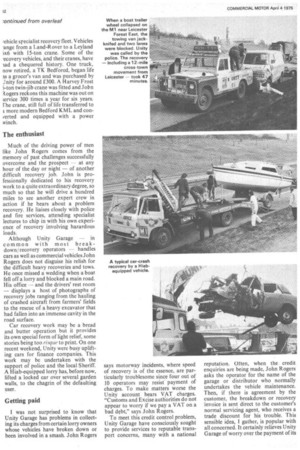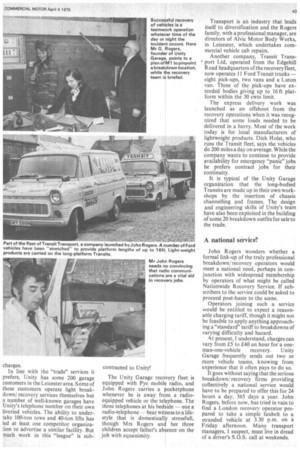Do hauliers need a •
Page 43

Page 44

Page 45

If you've noticed an error in this article please click here to report it so we can fix it.
specialized nationwide recovery service ?
by John Darker
ONE OF the worst chores known to road transport operators is to take effective action when a vehicle breakdown is reported. As anyone who has ever taken down particulars of a breakdown incident will know, it is often difficult for the driver to pinpoint precisely where his vehicle is the most vital information for the recovery team.
The diagnosis of the fault occasioning the breakdown is also a frequent problem. An experienced driver who has had the benefit of working as a mate to a skilled fitter will be in a good position to diagnose with some degree of probability the cause of a roadside breakdown. Ideally, every long distance lorry or coach driver would have some mechanical training to support his other vital qualities. Who can say how many drivers can spot the trouble with enough precision as to say what spares are needed?
A transport organization with a spread of depots in a region, or nationally, may be able to shoulder the very considerable cost of its own breakdown and recovery service. But the vast majority of operators cannot contem plate this. They could do so, perhaps, if the appropriate trade association provided a co-operatively financed facility but even this solution would be expensive if the organizations representing the professional and own-account hauliers and the bus industry provided parallel recovery services.
In a rough and ready sense the existing spread of breakdown and recovery operators offers a national service but the facilities available at night and at weekends vary greatly, in line with the charges made. For some years there has been support for the idea of an integrated national breakdown recovery service but little effective has been done.
The firsthand view
In a recent talk with M r J ohn Rogers, a partner in Unity Garage Breakdown Service, at Leicester, I learned much at first hand of the problem seen from the recovery man's desk — and bedside. For John Rogers is a member of the selfstyled "3 a.m. Club", meaning that whatever the time of day or night a breakdown or recovery is logged, im mediate action will follow. Bread, down/ recovery organizations whic: undertake such work simply as a: ancillary to the repair and service o commercial vehicles do not, in Johi Roger's view, deserve to be qualified members of his highly professiona fraternity. To him, and to his tightly kni organization, the breakdown/ recover: job comes first.
Unity Garage does undertake repai work but the customers are clear': advised that breakdown/ recover operations are given priority.
Only a special breed of man wouk want to earn a living as a recover3 specialist. The work, thougt challenging, can be physically exhaust. ing. John Rogers once worked .himsel: to a standstill and had to be carried of: to hospital for a few days' complete rest his father (George Rogers), wilt founded the business, overworked foi many years and his health has suffere as a consequence.
Unity Garage Breakdown Service ha grown from a single ex-WD vehick equipped with a home-made crane, operating from a private house, to a 15 'chicle specialist recovery fleet. Vehicles .ange from a Land-Rover to a Leyland ix6 with 15-ton crane. Some of the .ecovery vehicles, and their cranes, have lad a chequered history. One truck, now retired, a TK Bedfored, began life as a grocer's van and was purchased by Jnity. for around £300. A Harvey Frost 5-ton twin-jib crane was fitted and Jan .ogers reckons this machine was out on ;ervice 300 times a year for six years. [he crane, still full of life transferred to more modern Bedford KML and converted and equipped with a power winch.
The enthusiast
Much of the driving power of men like John Rogers comes from the memory of past challenges successfully overcome and the prospect — at any hour of the day or night — of another difficult recovery job. John is professionally dedicated to his recovery work to a quite extraordinary degree, so much so that he will drive a hundred miles to see another expert crew in action if he bears about a problem recovery. He liaises closely with police and fire services, attending specialist lectures to chip in with his own experience of recovery involving hazardous loads.
Although Unity Garage — in common with most breakdown/recovery operators — handles cars as well as commercial vehicles John Rogers does not disguise his relish for the difficult heavy recoveries and tows. He once missed a wedding when a boat fell off a lorry and blocked a main road. His office — and the drivers' rest room — displays a host of photographs of recovery jobs ranging from the hauling of crashed aircraft from farmers' fields to the rescue of a heavy excavator that had fallen into an immense cavity in the road surface.
Car recovery work may be a bread and butter operation but it provides its own special form of light relief, some stories being too risque to print. On one recent weekend, Unity were busy uplifting cars for finance companies. This work may be undertaken with the support of police and the local Sheriff. A Hiab-equipped lorry has, before now, lifted a locked car over several garden walls, to the chagrin of the defaulting user.
Getting paid
was not surprised to know that Unity Garage has problems in collecting its charges from certain lorry owners whose vehicles have broken down or been involved in a smash. John Rogers says motorway incidents, where speed of recovery is of the essence, are particularly troublesome since four out of 10 operators may resist payment of charges. To make matters worse the Unity account bears VAT charges. "Customs and Excise authorities do not appear to worry if we pay a VAT on a bad debt," says John Rogers.
To meet this credit control problem, Unity Garage have consciously sought to provide services to reputable transport concerns, many with a national reputation. Often, when the credit enquiries are being made, John Rogers asks the operator for the name of the garage or distributor who normally undertakes the vehicle maintenance. Then, if there is agreement by the customer, the breakdown or recovery invoice is sent direct to the customer's normal servicing agent, who receives a trade discount for his trouble. This sensible idea, I gather, is popular with all concerned. It certainly relieves Unity Garage of worry over the payment of its charges.
In line with the "trade" services it prefers, Unity has some 200 garage customers in the Leicester area. Some of these customers operate light breakdown/ recovery services themselves but a number of well-known garages have Unity's telephone number on their own liveried vehicles. The ability to undertake 100-ton tows and 40-ton lifts has led at least one competitor organization to advertise a similar facility. But much work in this "league" is sub contracted to Unity!
The Unity Garage recovery fleet is equipped with Pye mobile radio, and John. Rogers carries a pocketphone whenever he is away from a radioequipped vehicle or the telephone. The three telephones at his bedside — one a radio-telephone bear witness to a lifestyle that is domestically stressfull, though Mrs Rogers and her three children accept father's absence on the job with equanimity. Transport is an industry that lends itself to diversification and the Rogers family, with a professional manager, are directors of Alvic Motor Body Works, in Leicester, which undertakes commercial vehicle cab repairs.
Another company, Transit Trans' port Ltd, operated from the Edgehill Road headquarters of the recovery fleet, now operates 11 Ford Transit trucks — eight pick-ups, two vans and a Luton van. Three of the pick-ups have extended bodies giving up to 16 ft platform within the 30 cwts limit.
The express delivery work was launched as an offshoot from the recovery operations when it was recognized that some loads needed to be delivered in a hurry. Most of the work today is for local manufacturers of lightweight products. Dick Holst, who runs the Transit fleet, says the vehicles do 200 miles a day on average. While the company wants to continue to provide availability for emergency "panic" jobs he prefers contract jobs for their continuity.
It is typical of the Unity Garage organization that the long-bodied Transits are made up in their own workshops by the insertion of chassis channelling and frames. The design and engineering skills of Unity's team have also been exploited in the building of some 20 breakdown outfits for sale to the trade.
A national service?
John Rogers wonders whether a formal link-up of the truly professional breakdown/ recovery operators would meet a national need, perhaps in conjunction with widespread membership by operators of what might be called Nationwide Recovery Service. If subscribers to the service could be asked to proceed post-haste to the scene.
Operators joining such a service would be entitled to expect a reasonable charging tariff, though it might not be feasible to apply anything approaching a "standard" tariff to breakdowns of varying difficulty andhazard.
At present, I understand, charges can vary from £5 to £40 an hour for a oneman-one-vehicle recovery. Unity Garage frequently sends out two or more vehicle teams, knowing from experience that it often pays to do so.
It goes without saying that the serious breakdown/ recovery firms providing collectively a national service would have to be prepared to offer this for 24 hours a day, 365 days a year. John Rogers, before now, has tried in vain to find a London recovery operator prepared to take a simple fanbelt to a stranded vehicle at 3.30 p.m. on a Friday afternoon. Many transport managers, I suspect, must live in dread of a driver's S.O.S. call at weekends.




































































































